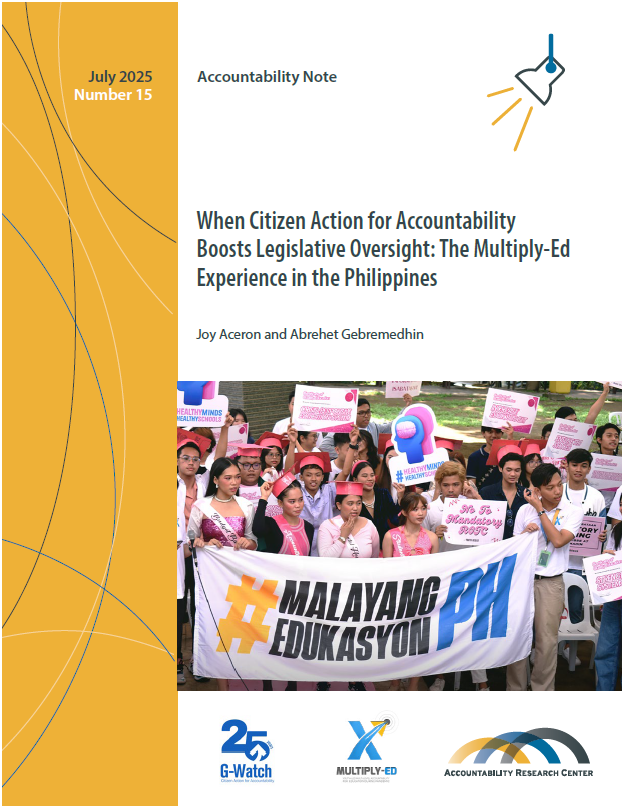
When Citizen Action for Accountability Boosts Legislative Oversight: The Multiply-Ed Experience in the Philippines
Date: July 2025
Author(s): Joy Aceron and Abrehet Gebremedhin
Publication type: ARC Accountability Note
Published by: Accountability Research Center
The Philippines has long been confronting an education crisis. This was exacerbated by Covid-19, which prevented tens of millions of public school students from going to school. As a response, the national government developed a new education system to enable learners to continue learning amid the global health emergency. Such drastic changes in the education system and long-standing systemic problems in education governance prompted accountability checks to be undertaken in state and society to ensure responsiveness to learners and effectiveness in bringing forth education reforms.
This Accountability Note on education reform in the Philippines presents an empirical pathway by which two distinct but complementary bodies have interfaced for a shared agenda of systemic education reform. These two parallel processes—an independent, citizen-led civil society organization, Multiply-Ed, and a congressional oversight committee, the Education Commission II (EDCOM II)—emerged with overlapping findings, actions, and agendas, showing the value of synergy between citizen-led action and government oversight.
We demonstrate that accountability processes within the state and society can converge and reinforce each other even when there is no normalized collaboration. Common issues are tackled, institutional interfacing paves the way for information and knowledge to be shared, and commitment to the overarching shared goal of education reform is reaffirmed. However, even beyond converging findings, independent citizen-led monitoring like that conducted by Multiply-Ed has a distinct added value for the education sector. Through its movement-based approach to accountability, Multiply-Ed has identified an action-oriented reform agenda overlooked by legislative oversight mechanisms, that can help advance and sustain the reforms.
This Accountability Note provides key takeaways for both social constituencies and government duty-bearers seeking to identify and address shared agendas through accountability.
• Independent accountability efforts of state oversight bodies such as EDCOM II and citizen-led monitoring initiatives like Multiply-Ed can produce shared agendas and findings that are mutually reinforcing and may lead to progress towards common goals.
• In the case of the interface between civil society accountability efforts and government oversight in the education sector in the Philippines, a shared agenda of enhancing the role of local governments, ensuring timely access to learning resources, ensuring teaching quality, and providing an adequate budget for education has been reinforced.
• By bringing in the perspectives of citizens through platforms such as school governance councils, independent citizen-led monitoring provides a distinct added value beyond state oversight, offering solutions that are action-oriented and systemic, and sustain accountability amid the dynamics of political elites.
• Mutually-reinforcing agendas and processes shared between civil society accountability actors and government oversight bodies can be key to harnessing state-society synergy, and pivotal in enabling progress towards power-shifting reforms.
Joy Aceron is Convenor-Director of Government Watch, a citizen action movement for accountability in the Philippines that aims to improve governance of public services and to deepen democracy. She has more than two decades of experience with civil society–government engagement for public accountability and has worked oneducation governance since 2004. Since 2017, she has also been an advisor and researcher at the Accountability Research Center (ARC). She also currently serves as social accountability advisor and coalition partner in Multiply-Ed, a youth-led, multi-level, and multi-sectoral initiative to advance transparency, participation, and accountability in education governance (supported by Education Out Loud). The Multiply-Ed coalition uses ‘vertical integration’ a policy monitoring and advocacy strategy which G-Watch and ARC have been developing together since 2016.
Abrehet Gebremedhin is a researcher at ARC and a PhD candidate at the School of International Service at American University Washington D.C. Her academic research centers on monitoring and evaluation, civil society engagement in education and health, transnational aid for education, and youth mobilization.
